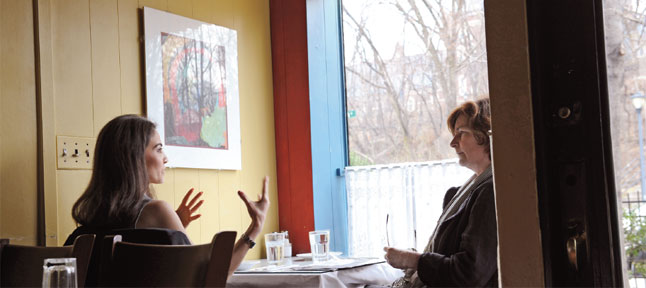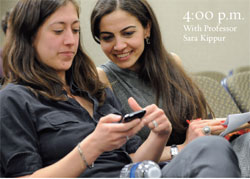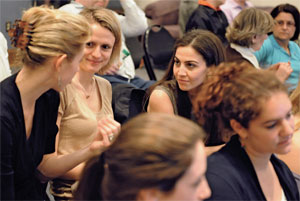

12:10 p.m. On this day, Hanna has a lunch meeting with Dean of Faculty Rena Fraden. The two chat about Hanna’s scholarship and teaching. “She likes to check in and see how I am doing as a junior faculty member in my third year,” says Hanna. Had it been Thursday, however, Hanna would be in Mather Hall, hosting the weekly “Arabic Table,” a place for students of all levels to practice their Arabic and learn more about the Middle East. “There is a mix of colloquial and formal Arabic spoken, so it gives you some insight into the culture,” says El-Hachem. Topics run from music to the troubling situation in Syria. “We talk almost entirely in Arabic, even telling jokes,” says Hanna.
2:30 p.m. By mid-afternoon, Hanna is back in Seabury Hall for office hours. “I advise every student who travels to an Arabic-speaking country,” she says. Most students go to sites in Jordan or Morocco, though she also sends students to Lebanon. “One student did a summer program at the University of Beirut and ended up jumping a full year in Arabic,” she says. Clemente is working with Hanna to plan a fall semester in Jordan, followed by a semester in Denmark in the spring. “I want to look at immigrant and refugee populations in both these countries and follow their trajectory from the Middle East to Europe as immigrants or refugees,” she says.
 3:30 p.m. Hanna
meets with Haifa Gharbi,
Trinity’s first Fulbright
Language Teaching
Assistant in Arabic. The
two discuss an event
Gharbi will lead tomorrow
at the House of Peace.
Gharbi will speak about
the Tunisian revolution
and share her experience
of the Arab Spring, which
started in Tunisia last year.
The House of Peace, one
of several student-run
theme houses, is a place
where Trinity students
meet to explore Middle
Eastern politics, history,
food, music, dance,
religions, and languages.
3:30 p.m. Hanna
meets with Haifa Gharbi,
Trinity’s first Fulbright
Language Teaching
Assistant in Arabic. The
two discuss an event
Gharbi will lead tomorrow
at the House of Peace.
Gharbi will speak about
the Tunisian revolution
and share her experience
of the Arab Spring, which
started in Tunisia last year.
The House of Peace, one
of several student-run
theme houses, is a place
where Trinity students
meet to explore Middle
Eastern politics, history,
food, music, dance,
religions, and languages.
 4:10 p.m. Hanna
joins her colleagues at a
monthly faculty meeting,
where they discuss
campus security and Vice
President for Finance and
Operations Paul Mutone
delivers a report on the
AY12-13 budget.
Though she fi rst came to
the college on a “gloomy,
snowy, and cold day” in
December (“I wasn’t
impressed with the
weather.”) the warmth
of her Trinity colleagues
delights her. “I feel so at
home in this community of
scholars,” she says.
Coming from a large
university, she was
unfamiliar with liberal arts
institutions, and is grateful for the opportunity to
collaborate with faculty
members from other
disciplines. “It makes
my academic life more
enriching when I get to
interact with this diverse
group of colleagues,” she
says. Last year, she cofounded
a writing group
with faculty who work on
French, German, Chinese,
and Spanish literature and
culture. “Our monthly
meetings and discussions
are intellectually inspiring.”
4:10 p.m. Hanna
joins her colleagues at a
monthly faculty meeting,
where they discuss
campus security and Vice
President for Finance and
Operations Paul Mutone
delivers a report on the
AY12-13 budget.
Though she fi rst came to
the college on a “gloomy,
snowy, and cold day” in
December (“I wasn’t
impressed with the
weather.”) the warmth
of her Trinity colleagues
delights her. “I feel so at
home in this community of
scholars,” she says.
Coming from a large
university, she was
unfamiliar with liberal arts
institutions, and is grateful for the opportunity to
collaborate with faculty
members from other
disciplines. “It makes
my academic life more
enriching when I get to
interact with this diverse
group of colleagues,” she
says. Last year, she cofounded
a writing group
with faculty who work on
French, German, Chinese,
and Spanish literature and
culture. “Our monthly
meetings and discussions
are intellectually inspiring.”
